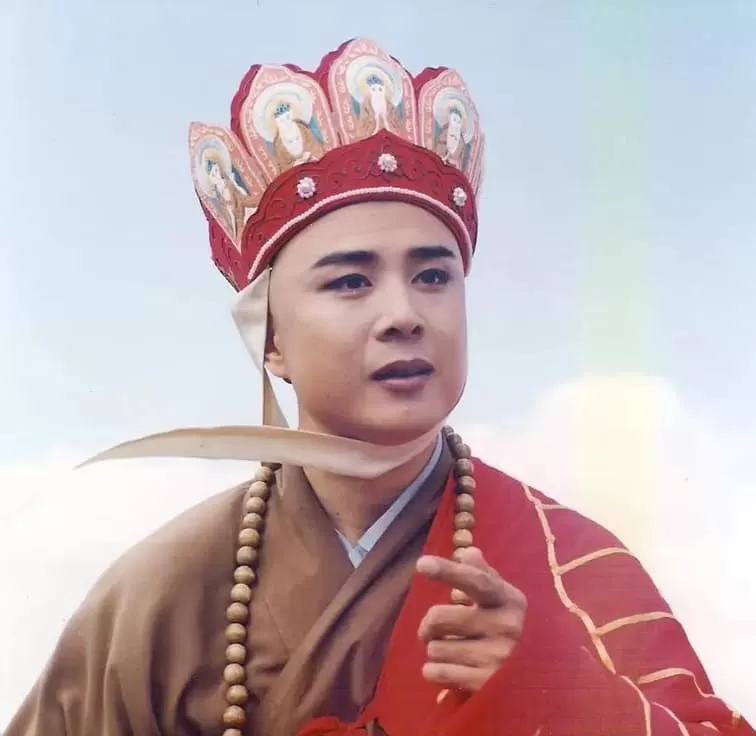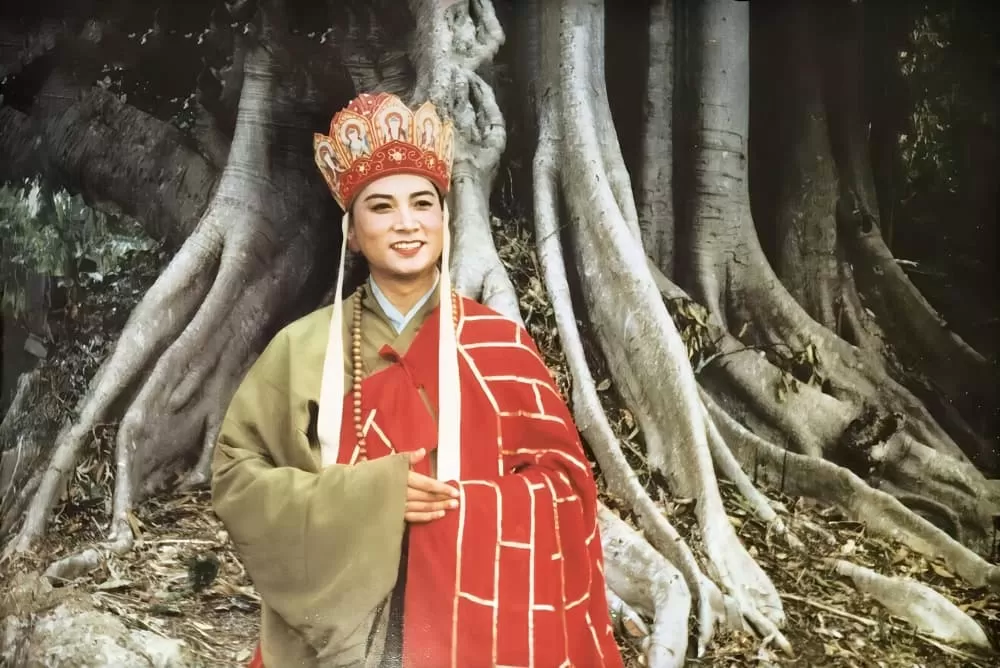
Tang Monk, a character from the classic novel Journey To The West, was surnamed Chen in his secular life. His childhood name was Jiang Liu'er, and his Buddhist name was Xuan Zang, with the honorific San Zang.
In a previous life, he was Jin Chanzi, the second disciple of Tathagata Buddha. Due to his disrespect for Buddhist teachings, he was exiled by Tathagata to the Tang Dynasty, where he was reborn as the son of Chen Guangrui, a top-ranked scholar. As his parents suffered hardships, Tang Monk grew up in Jinshan Temple. He had no interest in worldly honors and glory, preferring instead to cultivate Buddhist practice. He was proficient in countless Buddhist scriptures and was chosen by Emperor Li Shimin to preside over the "Water and Land Dharma Assembly." Guanyin Bodhisattva recognized his identity and bestowed upon him a Buddhist treasure—a brocaded Kashaya robe and a nine-ringed staff, guiding him to travel westward to obtain Mahayana Buddhist scriptures. Along his journey, he successively recruited Sun Wukong, The White Dragon Horse, Zhu Bajie, and Sha Wujing as his protectors and mounts, relying on their protection until they reached the Great Thunderclap Temple in the West.
Tang Monk was innocent in character, compassionate, and had a firm will to obtain the scriptures. However, he was also stubborn and narrow-minded, often deceived by demons and placed in danger. He twice drove away Sun Wukong. It was only after the incident with the "Imitation Monkey King" that Tang Monk and his disciples abandoned their doubts and ultimately overcame the eighty-one calamities, achieving enlightenment and being honored by Tathagata as "Zenith Virtuous Buddha."
Tang Monk possesses a majestic and noble demeanor, with a distinguished and handsome appearance. His teeth are as white as silver, and his lips are red and well-formed. His forehead is flat and broad, and his temples are full. His eyes are bright and his eyebrows are clear, giving him a long and distinguished jawline. His ears are large and round, marking him as a true hero, and his entire person exudes an air of talent and distinction.
Tang Monk, also known as Xuan Zang and Chen Yi in his secular life, was born in Luoyang, Henan. His fate was fraught with misfortunes from a young age. After his father, Chen Guangrui, became the top scholar in the imperial examinations, he was killed. To save Tang Monk's life, his mother, Yin Wenjiao, placed him in a wooden box and let him drift down the river, where he was later rescued and raised by Abbot Fahming of Jinshan Temple. Upon reaching adulthood, he devoted himself to Buddhist studies and was granted the title of "Sacred Monk, Younger Brother of the Emperor" by Emperor Taizong of Tang due to his proficiency in Buddhist scriptures. During the Zhenguan period, he was sent on a mission to the West to seek Buddhist teachings. He traveled alone through deserts and snow-capped mountains, enduring eighty-one calamities, and recruited three disciples, including Sun Wukong. He eventually arrived at the Nalanda Monastery in India to study Buddhism. After seventeen years, he returned to Tang with over six hundred Buddhist scriptures in Sanskrit. Upon his return, he presided over the translation of these scriptures, founded the Yogācāra school, and was honored with the title of "Tripitaka Master." After his death, a tower was built to enshrine his remains, and his legendary life laid the foundation for Mahayana Buddhism in Central China.
Tang Monk avoids looking at evil sights and listening to lewd sounds. He regards beautiful appearances as worthless and gold and jewels as dust. His entire life was dedicated to Zen meditation, and he never strayed far from Buddhist territory. He had no interest in romantic entanglements, only focusing on cultivating his spiritual nature.
Grandmother: Zhang, who fell ill halfway and could not accompany Chen Guangrui to Jiangzhou. She stayed at the Wanhua Inn and later lived in a broken kiln by the south gate for over a decade due to lack of money and news of her son-in-law.
Grandfather: Yin Kaishan, the prime minister of Tang Dynasty. After learning of the tragedy of his daughter and son-in-law, he led sixty thousand troops to Jiangzhou and captured and executed Liu Hong and Li Biao.
Father: Chen Er (styled Guangrui), who became the top scholar in the imperial examinations in the thirteenth year of the Zhenguan period. He was killed by Liu Hong and Li Biao while on his way to take office in Jiangzhou. Due to his previous rescue of the Dragon King of Hongjiang, his body was preserved by the dragon king after his death, and his soul served as a commander in the Dragon King's palace. After Yin Kaishan captured and killed Liu Hong and Li Biao, the dragon king helped Chen Guangrui's soul return to his body, allowing him to reunite with his family. He later rose to the position of scholar.
Mother: Yin Wenjiao (also known as Mantangjiao), the daughter of Yin Kaishan and the wife of Chen Guangrui. She was captured by Liu Hong and Li Biao while accompanying her husband to take office in Jiangzhou. To protect her unborn child, she submitted to Liu Hong. After her vengeance was achieved, she considered herself dishonored and committed suicide after seeing her family.
Acquaintances
Zhen Yuanzi, the abbot of Wuzhuang Temple and the ancestor of earth immortals. He is also known as "The One Who Exists with the World." He met Tang Monk's previous life, Jin Chanzi, at the Western "Lanpen Assembly."
Disciples
Sun Wukong: The Monkey King, who once caused havoc in Heaven and was imprisoned under the Five Elements Mountain. Despite his rebellious nature, he possesses great magical powers and protects Tang Monk from demons.
Zhu Bajie: Formerly the Marshal of Heavenly Waters, he was demoted to a pig demon for flirting with Chang'e. Although greedy, lazy, and lustful, he is honest, loyal, and brave, wielding a nine-toothed rake.
Sha Wujing: Formerly the General Who Rolls Up the Curtains, he was demoted to the Flowing Sand River for breaking a glass jar. Silent and hardworking, he carries a demon-subduing staff.
Bailongma: The third prince of the Western Sea Dragon King, who was transformed into a white horse to carry Tang Monk westward after burning a pearl in the palace. He also demonstrates his abilities in times of crisis.
The five of them endured numerous trials and tribulations before finally achieving enlightenment and completing their mission to obtain the Buddhist scriptures, becoming the "Five Saints."

In the Qing Dynasty, the Taoist recluse Dan Yizi, also known as the Dream-Haunted Hermit, said: "Tang Monk is the reincarnation of the Golden Cicada. His aspirations are pure, and his conduct is virtuous. The task of obtaining the Buddhist scriptures is of immense merit and virtue, earning him the title of Sandalwood Virtue."
Liu Yiming, a scholar of the Yi-ology (the study of changes and transformations) in the Qing Dynasty, commented: "To let a small matter of hunger and thirst give rise to delusions of greed and infatuation, who could be more unwise than this? This is truly earnest advice given right to one's ears and face. Yet, Sanzang, instead of recognizing it as loyalty, felt unhappy. Relying on his life-saving kindness at the Two Realms Mountain, he scolded [his disciple] for being lazy. What is the reason for this?"
Provides The Most Comprehensive English Versions Of Chinese Classical Novels And Classic Books Online Reading.
Copyright © 2025 Chinese-Novels.com All Rights Reserved
